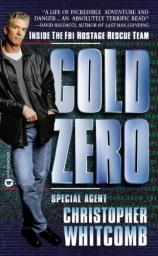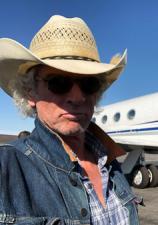Interview: October 12, 2001
October 12, 2001
COLD ZERO is a powerful, insightful book, unnerving in its timeliness. A former FBI sniper, Christopher Whitcomb delves into the inner workings of the FBI, explaining them in plain language to civilian readers. Author Dini Von Mueffling spoke with Whitcomb about the recent terrorist attacks and the strain of being an agent and a father.
BRC: While you were in the FBI, did you ever look back and regret that you had joined?
CW: Not for a moment. That isn't to say the job was always easy or enjoyable. It wasn't. Events such as Ruby Ridge and Waco gave me new insights about law enforcement and how it should operate in a free society, but I have never regretted my decision to join. Growth often comes with some pain. That shouldn't make us shy from the journey.
Also, I've always thought that the FBI, like most organizations, is made up of individuals and rules. Both sometimes get broken. What makes the FBI strong is that its people believe in something greater than their own limitations. They learn from their mistakes and try to prevent similar shortcomings in the future. I'm proud of that.
BRC: How did the FBI react to your writing COLD ZERO, since the agency is notorious about discretion?
CW: The FBI was very gracious throughout the process. They vetted my manuscript, checked it for classified information and then offered the publisher a letter of approval. No agent had published a book while still on the rolls, so that created a lot of questions. In the end, the FBI decided that swearing to protect the Constitution doesn't mean giving up any of its protections. FBI agents share the same freedom of speech that all Americans are guaranteed.
On the other hand, the FBI is a pretty closed society. Whenever you step out and write a book like this, it brings a certain amount of personal scrutiny. I have been pleasantly surprised at how many agents have called or written to tell me that they would have told a similar story if given the opportunity.
BRC: How much of what you did as a sniper is left out?
CW: I wrote about much of what I did with HRT, but not everything. HRT has a wide-ranging mission, so I tried to walk a line between giving readers an "inside" look at the sniper trade without giving up classified information or sensitive techniques. Many of the people I wrote about are still doing the job. They are my friends and former colleagues. I wouldn't do anything to intentionally jeopardize their safety.
BRC: While this is a very personal story of the major part of your life, you write very little about the effect of this job on your wife? How did she take the particularly sensitive and dangerous natures of what you did?
CW: This may sound odd, but we seldom talked about "the job." There were lots of things I couldn't discuss and other things I didn't want to discuss. It always seemed easier to leave work at work and concentrate on more pleasant things at home.
My wife and I seemed to deal with this pretty well, but I think it took a toll on our kids. They didn't understand why I kept disappearing without notice or why I was gone half the time (literally).
I remember how, during the Waco siege, my younger son told all his second grade buddies that I was a sniper who made a living shooting people for the FBI. That didn't go over too well with his teachers or with my wife. Unfortunately, you can't just pack up and fly home to deal with things like that. Birthdays, holidays, anniversaries... you miss a lot.
BRC: Are you glad to be out or are you feeling itchy at this particular moment in time in our history?
CW: Leaving the FBI was one of the hardest things I have ever done. I was standing in my boss's office when the first plane hit, and I felt sick to my stomach. I had to sit back and watch while people I had worked with so many times grabbed their gear and got ready to deploy.
Unfortunately, I had already made the commitment to leave and there was no backing out. I realize now that I could never have picked a good time to go. I was in the crisis response business and as hard as it is to accept, there will always be another crisis.
BRC: As an expert in anti-terrorism, are we being alarmist in discussing the potential for biological or chemical warfare by terrorists on our home turf?
CW: No, we're not being alarmist, but I think we have to put things in perspective. No American has ever been killed or even injured in a terrorist attack involving chemical or biological weapons. That means you have a much higher chance of falling victim to a shark bite or a lightning bolt than the ebola virus. There are several reasons for this:
- Most biological agents survive poorly in an open environment.
- Chemical weapons diffuse easily without proper and rather large concentration.
- Both weapons are very difficult to grow or obtain. If someone did obtain them, they would have to take great precautions not to kill themselves long before they could hurt someone else.
- These weapons are hard to deploy. Many people talk about using crop dusters to dispense biological weapons but they haven't done enough research to understand that aerosol dispersion devices are sophisticated technologies. You can't drop an anthrax pill in a power washer and spray it all over town. It just doesn't work that way.
I think it is important for law enforcement to take all precautions, but the bottom line is that terrorists can ply their trade better with a pipe bomb in a shopping mall than a smallpox offensive. Terrorism is all about giving your enemy an overwhelming sense of vulnerability. We need to understand potential threats but realize that they are an unlikely extension of this war.
BRC: Did the attacks on September 11th surprise you?
CW: Yes. That sounds strange doesn't it? I made my living in the counter terrorism community and knew the potential for violence. I had traveled around the world chasing bin Laden and people like him. My office even spent a considerable amount of time thinking up scenarios for training exercises.
Still, no matter how much you prepare for something like this, you don't want to admit that it could happen. I remember watching the live TV coverage with a total sense of bewilderment. This attack was so simple technologically and so sophisticated logistically, it shocked everyone.
That's the tragic genius of terrorism --- no matter how much you know its out there, how prepared you feel, how much you want to fight it, no one can stop it all. If we're going to win this war on terrorism, we're going to have to engage these people on their own terms and make the consequences too severe for them to accept. Americans are a generous, fair, kind people, but it's time to accept that this truly is a war and that to win it we're going to have to get dirty. If we want our lives back, we'll have to get down in the gutter with these animals and hit them where they live.
BRC: Would you want any of your children to be FBI agents? How open are you with them about the sensitive nature of what you did?
CW: I'd be proud to have my kids join the FBI... as long as they tried being a doctor or an artist or a business executive first! No parent would want his kids to go through some of the things I have, but that's what it takes to keep this country free and I accept that.
I have always encouraged my kids to pursue whatever makes them happy. I remember the look in my own Dad's eye the afternoon I graduated from the FBI Academy. I have to say I'd probably get the same twinkle myself if they decided to pin on a badge. It's a noble profession, but it's not easy.
BRC: One of the more surprising aspects of the book is the revelation that the FBI operates not just on home turf, but internationally, with field offices in myriad nations. Do you think the agency should expand further? What does it do differently from, let's say, Special Ops forces or the CIA abroad?
CW: Just about everyone thinks the FBI works domestically and the CIA overseas, but it's a myth. The primary difference between the two agencies is that the CIA gathers intelligence while the FBI conducts criminal investigations.
In order to effectively represent U.S. interests, the FBI has staffed offices, or "legal attaches" in 44 countries with dozens of agents assigned to all kinds of international task forces, intelligence agencies, law enforcement operations and counter terrorism cells. I think it's important to remember that we live in a shrinking world with ever increasing U.S. interests. The FBI has reached out to address their concerns.
The recent terrorist attack has demonstrated how vital it is to broaden our investigative resources. Louis Freeh started the Bureau's international expansion, but Director Mueller will have to continue it. The CIA can gather all the intelligence it wants, but the FBI will have to investigate crimes, gather evidence and help bring people to justice. The two agencies have a common goal of stopping terrorism and international crime. That means we will have to engage evil where ever it hides.
BRC: What do you envision will happen in the near future? How long will our country be overtly at war?
CW: I think this "war" will go deep in the near future. The Bush administration has to show force with bombs and missiles, but the real work in this struggle will involve special operations agents and troops. We'll hear about terrorists showing up and disappearing from time to time, but I don't think this will look like any war America has seen before.
Civilian law enforcement and military operations have long been considered mutually exclusive. Now we're getting used to the idea of an FBI investigation followed by military prosecution. Law enforcement gathers the evidence and the Bush administration hands out the sentence with military action. That's never happened in this country before. I think it will generate considerable debate once people realize just what is happening.
BRC: Your next two books will be novels. What can you tell us about them?
CW: My next book is a novel called BLACK, which is about the "wet" side of counter terrorism work or "black walled operations." I think this book will give readers a whole new perspective on the traditional spy novel.
I wish I could put the book out right away to give people a look at what is going on behind the scenes, but then again, this sort of thing will be every bit as compelling a year from now. America is about to learn that there is a lot more than meets the eye in the world of counter terrorism.
Some stories you can tell in nonfiction like COLD ZERO. Some you have to tell as fiction. This book is going to walk that line and it is going to raise a lot of eyebrows.
BRC: Thank you so much for taking the time to talk with us. We really appreciate it.




